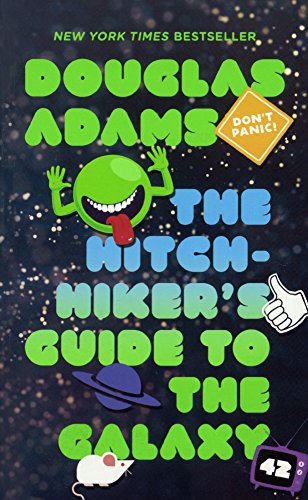2 reads, apparently growing on me
4 stars
2012 read, 3 stars: just confusing and only mildly amused by it.
2025 read, 5 stars: still confusing but less so and much funnier than I remember.

library binding, 224 pages
Published Sept. 27, 1995 by Turtleback Books.
The Hitchhiker's Guide to the Galaxy is the first of six books in the Hitchhiker's Guide to the Galaxy comedy science fiction "hexalogy" by Douglas Adams. The novel is an adaptation of the first four parts of Adams's radio series of the same name. The novel was first published in London on 12 October 1979. It sold 250,000 copies in the first three months.
The namesake of the novel is The Hitchhiker's Guide to the Galaxy, a fictional guide book for hitchhikers (inspired by the Hitch-hiker's Guide to Europe) written in the form of an encyclopaedia.
Also contained in:
2012 read, 3 stars: just confusing and only mildly amused by it.
2025 read, 5 stars: still confusing but less so and much funnier than I remember.
Sí, el libro sigue fresco. Y sigue siendo solo para las personas que disfrutan de lo absurdo (mundodisco, etc.). Si tienes dudas sobre si te gustará, yo me leería un artículo de los de El Mundo Today (entero, más allá del titular), porque este libro en realidad no es más que una sucesión de tonterías gordas. La serie de Futurama también bebe de esto, para que tengáis referencias.
A la vez, lo que destaca del libro es precisamente eso: el compromiso con la tontería, con el absurdo y la imaginación, porque todo está bien atado. Puede suceder y sucede cualquier cosa. Las más improbables. Pero todo está atado. Todo tiene una coherencia, y dar coherencia al disparate no es sencillo, y menos cuando se consigue adivinar una trama mayor.
En resumen, si disfrutas del disparate, bienvenide porque es todo un viaje.
Plus you'll understand many more pop culture references!
No soy aficionado a las novelas de ciencia-ficción ni tampoco a las de humor especialmente, pero sentía curiosidad por este título desde hacía tiempo por su aura pop de culto y tenía ganas de comprobar cómo mezclaba ambos géneros.
En términos generales logra ser ágil y entretenido, aunque más al inicio y al final y menos por en medio, cuando se ocupa de ampliar los horizontes del universo narrativo (literalmente, recordemos que va de viajeros espaciales). Algo de esperar, en tanto que Douglas Adams era quizá guionista antes que literato y... ya se sabe lo que pasa con la sacrosanta norma de que el principio y el final enganchen y sorprendan.
Me gusta su manera muy personal y arriesgada de usar los deus ex machina (algo ajeno a la historia que aparece de repente y resuelve los problemas, ejemplo desde Aristóteles de lo que no hay que hacer) para insinuar …
No soy aficionado a las novelas de ciencia-ficción ni tampoco a las de humor especialmente, pero sentía curiosidad por este título desde hacía tiempo por su aura pop de culto y tenía ganas de comprobar cómo mezclaba ambos géneros.
En términos generales logra ser ágil y entretenido, aunque más al inicio y al final y menos por en medio, cuando se ocupa de ampliar los horizontes del universo narrativo (literalmente, recordemos que va de viajeros espaciales). Algo de esperar, en tanto que Douglas Adams era quizá guionista antes que literato y... ya se sabe lo que pasa con la sacrosanta norma de que el principio y el final enganchen y sorprendan.
Me gusta su manera muy personal y arriesgada de usar los deus ex machina (algo ajeno a la historia que aparece de repente y resuelve los problemas, ejemplo desde Aristóteles de lo que no hay que hacer) para insinuar que nuestras vidas avanzan y dan vuelcos casi siempre a partir de cosas absolutamente imprevistas y de que el mero hecho de que existamos es materialización de una improbabilidad loca. También me gusta su acercamiento a la inteligencia artificial y la relación amistosa que pinta entre humanos y ordenadores. Por ahí conserva su vigencia.
Pero su estilo, entendido en un sentido más amplio, no me agrada tanto. Hay destellos líricos puntuales, pero confía excesivamente en el uso del disparate para hacer gracia. Es un tipo de recurso que en la tele funciona muy bien, pero en literatura a mí se me hace pesado y me inspira caducidad en el texto (o sea, que no quiero leerlo más de una vez).
Reitero que nunca me ha cautivado la literatura pop, subcultural, de entretenimiento, de género o de quiosco si esto conlleva de alguna manera falta de capas o el centrarse demasiado en un concepto o idea reconocible y machacarlo. Creo que Guía del autoestopista galáctico consigue desmarcarse de eso en parte, pero no completo.
Vamos, que está bien. 3 estrellas.
I had no idea! I’ve read the Hitchhiker’s books before, and I knew it was performed for radio, but I always thought the book came first.
As for the radio version, the Primary Phase is a delight. The voice actors are all top notch, especially Stephen Moore as Marvin the Paranoid Android, and the writing was so ahead of its time for the 70s (and the 80s and 90s, for that matter). I would easily pay 30 Alterian dollars a day to listen to this again and again.
The book doesn't go into entirely too much detail than the movie portrays. Still an awesome story worthy if reading if you haven't, but you'll want to save your time if you've watched it already.
Most of the fun stems from its unpredictability. There are also some hilarious quotes in here. But, besides its gags, it doesn't have a lot to offer. The only theme to it is that (human) life is largely insignificant. But it's only explored superficially. Especially when rereading, the book can become somewhat of a bore.
Lo quiero repetir. Joder, qué libro más maravillosamente absurdo y loco. Me encanta.

